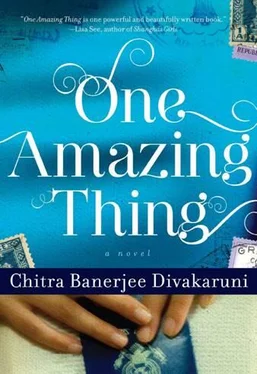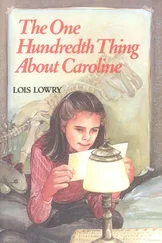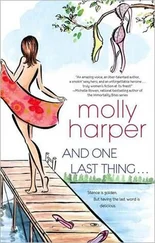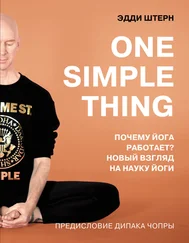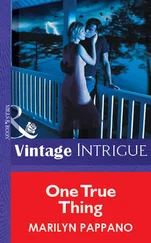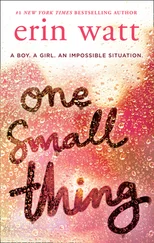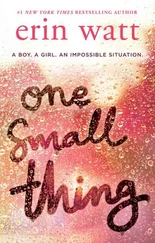I started playing something sad that I’d heard in my head as I walked along the beach after my conversation with Mark. But as I made my way through it, I found out that it wasn’t sad all the way through. It had leaps and trills and a ribbon of joy that kept looping back. After a while, the other boys heard the music and wandered over and sat down, too. My boy (that’s how I thought of him) might have felt proprietary, because he scooted up and put his hand on my knee. He smelled like strawberry jam. I played the melody for a long time, discovering something new with each pass-through, and then it was time for us to go home.
UMA THOUGHT HER BRAIN WAS SLOWING FROM A LACK OF FRESH air. After Lily finished, she found herself thinking of her father-but shouldn’t she have remembered him right after Tariq talked about his Abbajan? Shouldn’t she now be considering how she had always wanted a sibling, and how for years she had held a grudge against her parents for having deprived her of a ready entertainment that all her friends possessed?
During his college days in India, her father had played guitar. He fancied Elvis and was considered by his classmates to be quite a singer. He had told Uma this when she was about twelve, and she had collapsed in giggles, unable to imagine him as a slick-haired performer. Incensed, he had enlisted her mother’s aid. She had corroborated his story, telling Uma that was one of the reasons why, when the matchmaker had come with a proposal from his family, she had agreed to see him.
“Your mother, now, she was very fashionable as a college student,” Uma’s dad had said, sneaking a hand around her mother’s ample waist as he spoke. “She wore go-go glasses and stiletto heels and sleeveless sari blouses, and sometimes she skipped class and went with her friends to Metro Cinema to see American movies. The day I came to see her, she had painted her nails deep pink to match her sari. If I hadn’t had that guitar, you’d still be a speck in God’s eye.”
Uma had been intrigued by the images. They seemed equally fantastic: herself floating around in God’s eye and her pink-nailed mother floating around Calcutta in go-go goggles, discarding suitors at will. She had watched her parents, him balding, her plump and matronly, dressed in department-store clothing, leaning into each other with satisfied expressions, and felt a sorrow for the glamorous young selves they had discarded.
Her parents, however, still had a few surprises up their polyester sleeves, one of which her father would reveal during her first semester of college.
THE NINE SURVIVORS ATE THE LAST OF THEIR FOOD AS SLOWLY as they could, hunched against the dropping temperature. The hole in the ceiling was making the room even colder. They held their chewy bars and apple slivers close to their mouths as though they were afraid the morsels might disappear along the way. Cameron didn’t distribute the food this time. From where he sat, his spine wilting against Uma’s good arm, he raised an eyebrow in query at Malathi and Mangalam, and they cut things into the right number of pieces and gave them out. Uma noted that there were more snacks now than she had originally counted. People must have taken things out of their secret stashes and put them in the pile when no one was watching. There were a small bag of carrot sticks, one whole-wheat roll, and three small white-chocolate truffles, quite delicious, that Mangalam dissected with extra care. But all was gone in a few mouthfuls.
Cameron was whispering instructions in Uma’s ear. She announced that they could use the facilities one last time. The water would have risen almost to the lip of the toilet bowl by now. (What would they use for a bathroom after this? she wondered.) Since the bathroom door could no longer be pushed shut, people would have to wait outside Mangalam’s office to allow the user privacy.
A few people struggled into their wet shoes and climbed off the table gingerly. Mr. Pritchett, Uma noticed, stood at the end of the line. Hadn’t he just gone? But he was so proper that maybe the possibility of having to pee into a pitcher-or whatever it was that they would be reduced to doing next-made him nervous.
Alongside her, Cameron had stiffened. He, too, was watching Mr. Pritchett. When he whispered to Uma, she held up her broken arm and called out, “Mr. Pritchett, please, could you come here for a moment?” How could she have forgotten those cigarette breaks?
Mr. Pritchett looked irritated, but he could hardly refuse a cripple, could he? When he came near them, Cameron stretched out his hand and said, “Your cigarettes and lighter.”
“You don’t trust me?” Mr. Pritchett said, his shoulders belligerent. “You think I’d be stupid enough to light up and endanger all of us?” Uma was about to call Tariq, who was dozing on the adjacent desk, but Mr. Pritchett said, “You’re wrong, you suspicious bastard!” and threw a gold lighter and a crushed pack of Dunhills down onto the desk. He marched (as much as one can march in freezing, calf-high water) back to the bathroom line.
AS SHE WAITED IN LINE FOR THE BATHROOM, MRS. PRITCHETT was trying to remember something. Lily’s passion had touched her and drawn a memory almost to the surface. Something about her mother’s kitchen. But the cold water clutched at her legs with icy fingers, making her joints ache. The last few times, it had been hard to climb on and off the desk-her arthritis was acting up-but she hadn’t wanted to ask for help, hadn’t wanted anyone to know her body was betraying her. Dusty air coated her tongue, and a nagging smell she couldn’t quite place distracted her.
Mr. Pritchett distracted her, too. She could feel him at the rear of the line, emitting negative energy. She’d followed, out of the corner of her eye, the exchange between him and Cameron, the flinging down of the cigarettes and lighter. A great sympathy had risen up in her. She knew addiction, the way every brain cell focused on the forbidden substance, the way the nerves started to vibrate, guitar strings resonating to unheard music. She was planning to take a pill-maybe two-as soon as she was in the bathroom, so that when her turn to tell the story arrived, she would be at her best. She wished she could have shared the pills with Mr. Pritchett, but of course she couldn’t. She couldn’t even tell him how she felt about the kitten. There were people standing in line between them, and it would have embarrassed him.
The memory she’d been groping for came to her: she was sitting at that sunshine-yellow linoleum kitchen counter with her best friend, Debbie, each with a piece of celebratory peach pie in front of them. Mrs. Pritchett-Vivienne-had baked the pie. She had loved baking. The feel of warm risen dough against her palm. The joy of apples sliced for a pie, so thin that you could see through them. She had been good at it, too. Good enough for Debbie and her to plot all of senior year about running Debbie’s dad’s bakery once they graduated.
“Viv,” Debbie said, “I’ve got great news!”
“Don’t tell me-you’re getting married,” Vivienne said. It had been their standard response since ninth grade.
Debbie rolled her eyes. “Stupid! Dad said yes! He’ll let us run the bakery, on a trial basis, for six months.”
Why was Vivienne’s smile less dazzling than it should have been?
An excited Debbie didn’t notice. “We’ll be in charge,” she said. “Managing the employees, deciding the menu, buying the supplies, fixing prices-everything! Dad will teach me how to do the books. Mr. Parma will stay on and bake the bread, but you can make all the specialty items. If we do well, after some time Dad will let us buy the business from him. We won’t have to put any money down. We’ll pay him each month from the profits. What do you think?”
Читать дальше
